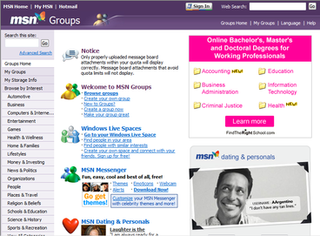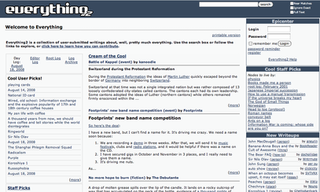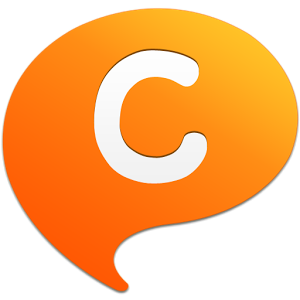
The Hypertext Transfer Protocol (HTTP) is an application layer protocol in the Internet protocol suite model for distributed, collaborative, hypermedia information systems. HTTP is the foundation of data communication for the World Wide Web, where hypertext documents include hyperlinks to other resources that the user can easily access, for example by a mouse click or by tapping the screen in a web browser.

A wiki is an online hypertext publication collaboratively edited and managed by its own audience, using a web browser. A typical wiki contains multiple pages for the subjects or scope of the project, and could be either open to the public or limited to use within an organization for maintaining its internal knowledge base.

A website is a collection of web pages and related content that is identified by a common domain name and published on at least one web server. Websites are typically dedicated to a particular topic or purpose, such as news, education, commerce, entertainment or social networking. Hyperlinking between web pages guides the navigation of the site, which often starts with a home page. As of December 2022, the top 5 most visited websites are Google Search, YouTube, Facebook, Twitter, and Instagram.
Web design encompasses many different skills and disciplines in the production and maintenance of websites. The different areas of web design include web graphic design; user interface design ; authoring, including standardised code and proprietary software; user experience design ; and search engine optimization. Often many individuals will work in teams covering different aspects of the design process, although some designers will cover them all. The term "web design" is normally used to describe the design process relating to the front-end design of a website including writing markup. Web design partially overlaps web engineering in the broader scope of web development. Web designers are expected to have an awareness of usability and be up to date with web accessibility guidelines.

A web hosting service is a type of Internet hosting service that hosts websites for clients, i.e. it offers the facilities required for them to create and maintain a site and makes it accessible on the World Wide Web. Companies providing web hosting services are sometimes called web hosts.

A news server is a collection of software used to handle Usenet articles. It may also refer to a computer itself which is primarily or solely used for handling Usenet. Access to Usenet is only available through news server providers.
Social software, also known as social apps or social platform, include communications and interactive tools that are often based on the Internet. Communication tools typically handle the capturing, storing and presentation of communication, usually written but increasingly including audio and video as well. Interactive tools handle mediated interactions between a pair or group of users. They focus on establishing and maintaining a connection among users, facilitating the mechanics of conversation and talk. Social software generally refers to software that makes collaborative behaviour, the organisation and moulding of communities, self-expression, social interaction and feedback possible for individuals. Another element of the existing definition of social software is that it allows for the structured mediation of opinion between people, in a centralized or self-regulating manner. The most improved area for social software is that Web 2.0 applications can all promote cooperation between people and the creation of online communities more than ever before. The opportunities offered by social software are instant connection and the opportunity to learn.An additional defining feature of social software is that apart from interaction and collaboration, it aggregates the collective behaviour of its users, allowing not only crowds to learn from an individual but individuals to learn from the crowds as well. Hence, the interactions enabled by social software can be one-on-one, one-to-many, or many-to-many.

An Internet forum, or message board, is an online discussion site where people can hold conversations in the form of posted messages. They differ from chat rooms in that messages are often longer than one line of text, and are at least temporarily archived. Also, depending on the access level of a user or the forum set-up, a posted message might need to be approved by a moderator before it becomes publicly visible.
Internet research is the practice of using Internet information, especially free information on the World Wide Web, or Internet-based resources in research.

MSN Groups was a website part of the MSN network which hosted online communities, and which contained Web pages, hosted images, and contained a message board. MSN Groups was shut down on February 21, 2009, as part of a migration of online applications and services to the Windows Live brand. Windows Live Groups, a part of the Windows Live branding, was never marketed as, or intended to be a replacement for, MSN Groups.
An Internet bot, web robot, robot or simply bot, is a software application that runs automated tasks (scripts) over the Internet, usually with the intent to imitate human activity on the Internet, such as messaging, on a large scale. An Internet bot plays the client role in a client–server model whereas the server role is usually played by web servers. Internet bots are able to perform tasks, that are simple and repetitive, much faster than a person could ever do. The most extensive use of bots is for web crawling, in which an automated script fetches, analyzes and files information from web servers. More than half of all web traffic is generated by bots.
A wordfilter is a script typically used on Internet forums or chat rooms that automatically scans users' posts or comments as they are submitted and automatically changes or censors particular words or phrases.

IMDb is an online database of information related to films, television series, podcasts, home videos, video games, and streaming content online – including cast, production crew and personal biographies, plot summaries, trivia, ratings, and fan and critical reviews. IMDb began as a fan-operated movie database on the Usenet group "rec.arts.movies" in 1990, and moved to the Web in 1993. Since 1998, it is now owned and operated by IMDb.com, Inc., a subsidiary of Amazon.
URL shortening is a technique on the World Wide Web in which a Uniform Resource Locator (URL) may be made substantially shorter and still direct to the required page. This is achieved by using a redirect which links to the web page that has a long URL. For example, the URL "https://example.com/assets/category_B/subcategory_C/Foo/" can be shortened to "https://example.com/Foo", and the URL "https://en.wikipedia.org/wiki/URL_shortening" can be shortened to "https://w.wiki/U". Often the redirect domain name is shorter than the original one. A friendly URL may be desired for messaging technologies that limit the number of characters in a message, for reducing the amount of typing required if the reader is copying a URL from a print source, for making it easier for a person to remember, or for the intention of a permalink. In November 2009, the shortened links of the URL shortening service Bitly were accessed 2.1 billion times.
In computing, logging is the act of keeping a log of events that occur in a computer system, such as problems, errors or just information on current operations. These events may occur in the operating system or in other software. A message or log entry is recorded for each such event. These log messages can then be used to monitor and understand the operation of the system, to debug problems, or during an audit. Logging is particularly important in multi-user software, to have a central overview of the operation of the system.

On the Internet, a block or ban is a technical measure intended to restrict access to information or resources. Blocking and its inverse, unblocking, may be implemented by the owners of computers using software. Some countries, notably China and Singapore, block access to certain news information. In the United States, the Children's Internet Protection Act requires schools receiving federal funded discount rates for Internet access to install filter software that blocks obscene content, pornography, and, where applicable, content "harmful to minors".

Everything2 is a collaborative online community consisting of a database of interlinked user-submitted written material. E2 is moderated for quality, but has no formal policy on subject matter. Writing on E2 covers a wide range of topics and genres, including encyclopedic articles, diary entries, poetry, humor, and fiction.
XRumer is a piece of software made for spamming online forums and comment sections. It is marketed as a program for search engine optimization and was created by BotmasterLabs. It is able to register and post to forums with the aim of boosting search engine rankings. The program is able to bypass security techniques commonly used by many forums and blogs to deter automated spam, such as account registration, client detection, many forms of CAPTCHAs, and e-mail activation before posting. The program utilises SOCKS and HTTP proxies in an attempt to make it more difficult for administrators to block posts by source IP, and features a proxy checking tool to verify the integrity and anonymity of the proxies used.

ChatON was a global mobile communication service introduced by Samsung Electronics in September 2011. ChatON served more than 120 countries in 62 languages. ChatON was available on Android, iOS, BlackBerry, Windows Phone, Windows Mobile (Korea), and Bada smartphones. Additionally, a web client was offered for access to the service via web browsers. Users could invite and register buddies via Facebook and Twitter as well as share ChatON content on Facebook. Among ChatON's unique features were allowing users to create Animation messages, Broadcast to send personal notices in a group chat room, and the Trunk which stores media files shared in chats. When a user logs in ChatON, the user's buddy list is available on any connected device.

Twister is an experimental peer-to-peer microblogging program. It is decentralized; consequently it cannot be shut down by an attack as there is no single point to attack. The system uses end-to-end encryption to safeguard communications. It is based on both BitTorrent- and Bitcoin-like protocols and has been likened to a distributed version of Twitter.











